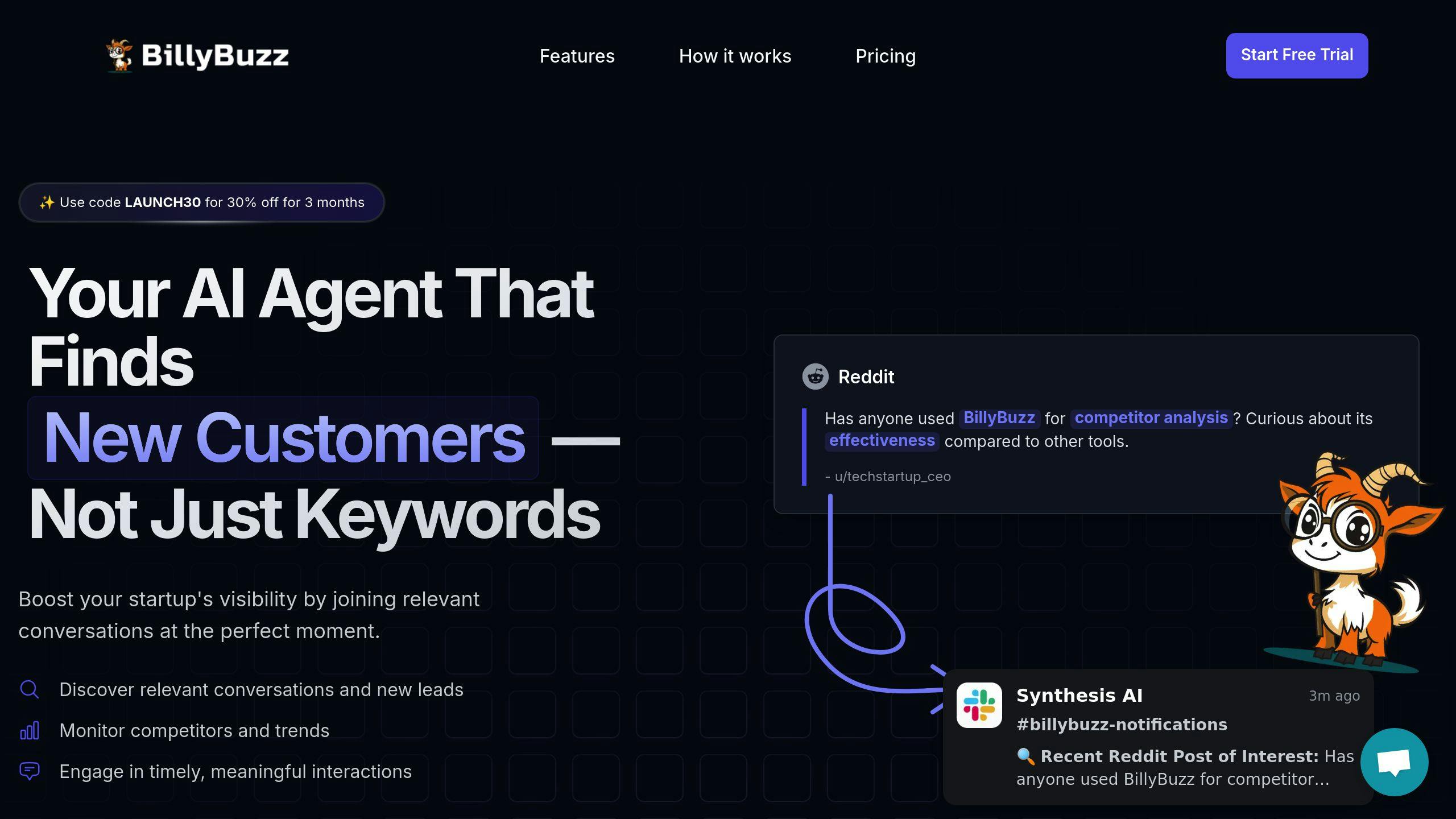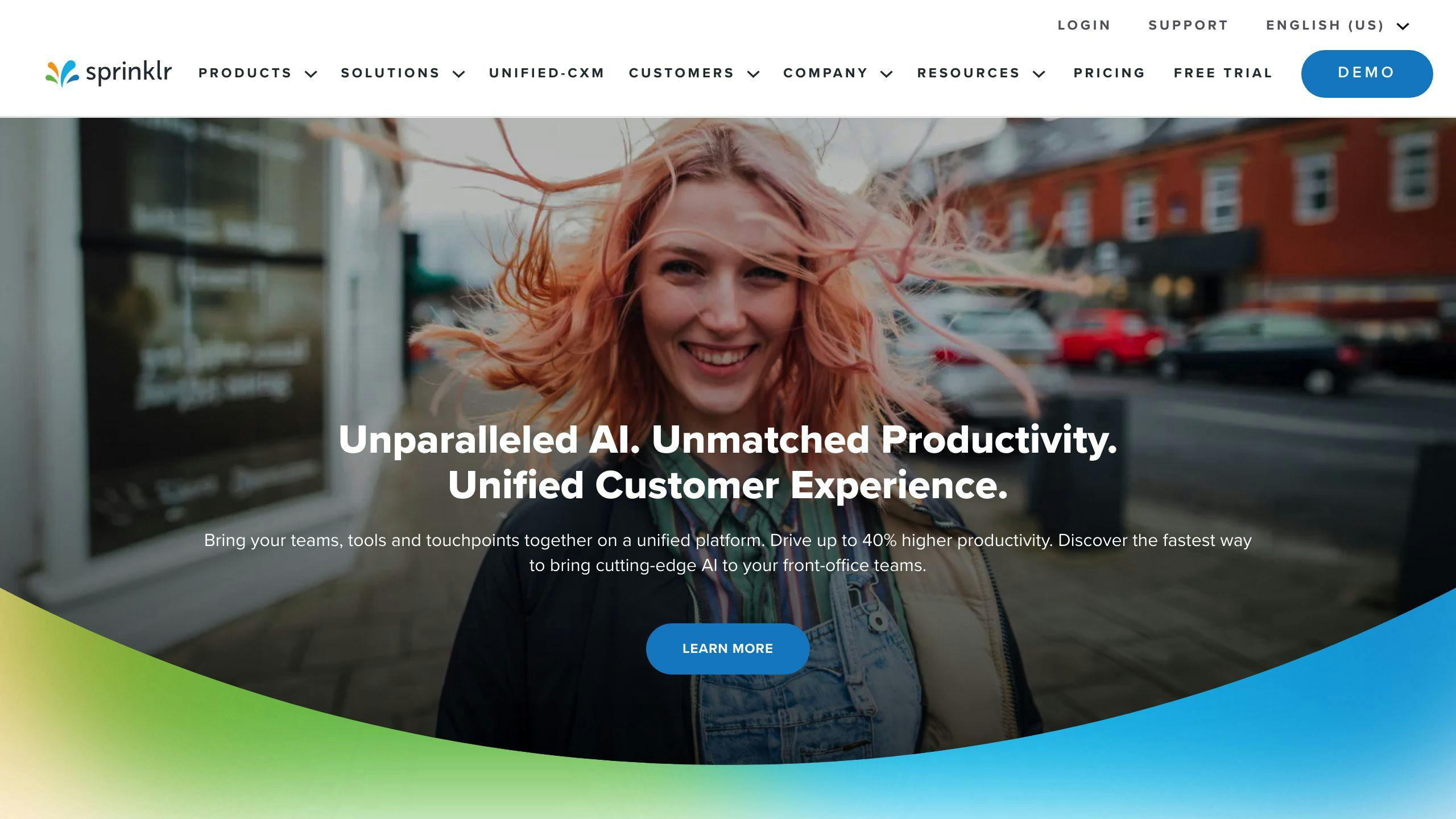
How AI Helps Monitor Brand Reputation with Feedback
AI tools are changing the way businesses manage their brand reputation by analyzing customer feedback in real-time. They help companies respond faster to issues, spot trends early, and organize feedback into actionable insights. Key benefits include:
- Real-time monitoring: Track brand mentions instantly across platforms.
- Sentiment analysis: Understand customer emotions and tone.
- Trend detection: Identify recurring issues or opportunities.
- Feedback categorization: Sort feedback by tone, topic, and platform.
Popular tools like Sprinklr, Brand24, and BillyBuzz offer features like sentiment analysis, alerts for negative mentions, and competitor tracking. These tools enable businesses to handle negative feedback quickly, improve customer communication, and gain market insights.
| Tool | Focus Area | Key Feature | Pricing |
|---|---|---|---|
| Sprinklr | Enterprise management | Broad channel coverage | Custom pricing |
| Brand24 | Sentiment analysis | Trend identification | Starts at $49/mo |
| BillyBuzz | Social media monitoring | Subreddit tracking | Starts at $15/mo |
AI ensures businesses can protect their reputation, respond faster, and make data-driven decisions based on customer feedback.
Ways AI Uses Feedback to Monitor Brand Reputation
Analyzing Sentiment in Real Time
AI tools are excellent at analyzing customer feedback as it happens. They can pick up on subtle tones and the context behind customer messages across platforms. Tools like Sprinklr and Hootsuite Listening offer businesses instant insights into how their audience feels, making it easier to respond quickly to potential reputation issues before they snowball.
Spotting Trends and Issues Early
AI's ability to predict patterns is a game-changer for spotting potential reputation risks. Tools such as BillyBuzz scan social media discussions to uncover recurring issues or customer frustrations, like frequent complaints about a product feature. This early detection gives companies a chance to address problems head-on and even take advantage of positive trends when they arise.
Understanding these trends in real time allows businesses to act swiftly, addressing concerns and amplifying positive feedback.
Sorting Feedback into Useful Categories
After identifying trends, AI steps in to organize feedback into actionable groups, making decision-making smoother. Algorithms automatically sort feedback by tone (positive, negative, or neutral), topics (like product features or customer service), and the platforms where the feedback originated. This categorization helps businesses prioritize their responses and craft focused strategies.
Tools such as Brand24 make this process even easier by highlighting key areas that need attention. This organized approach ensures businesses can respond effectively and maintain their reputation with data-driven strategies that truly resonate with their customers.
Benefits of Using AI for Brand Reputation
Managing Negative Feedback Quickly
AI tools help businesses stay on top of potential reputation risks by monitoring brand mentions across social media, review platforms, and news outlets. Tools like Sprinklr and Brand24 send instant alerts when negative sentiment surfaces, allowing customer service teams to handle pressing issues immediately. These real-time notifications mean customer concerns can be resolved in minutes instead of hours. AI also spots recurring patterns in negative feedback, enabling companies to fix underlying problems before they escalate.
In addition to managing feedback, AI improves how businesses interact with their customers, ensuring every exchange leaves a positive impression.
Improving Customer Communication
AI-powered systems streamline customer engagement by providing faster, more consistent responses across all channels. These tools efficiently handle customer inquiries, routing them to the appropriate team for quick resolution, which reduces frustration. AI chatbots, for example, can instantly address routine questions, freeing up human agents to focus on more complex issues that need personal attention.
Improving customer communication is just one piece of the puzzle - AI also helps businesses gain a competitive edge by offering insights into market trends and competitors.
Learning About Competitors and the Market
AI tools aren’t limited to reputation management. They also provide valuable insights into competitors and market trends, offering a broader view for smarter decision-making. Take BillyBuzz, for instance - it uses contextual analysis to go beyond basic keyword searches, uncovering meaningful conversations about your brand and competitors. This helps businesses understand customer pain points, hot topics, and emerging opportunities.
With these tools, businesses can:
- Assess competitor strategies and their impact on the market
- Spot new trends before they gain traction
- Find opportunities to stand out from the competition
What is Sentiment Analysis?
sbb-itb-efb8de3
AI Tools That Help Monitor Brand Reputation
AI offers businesses a variety of tools to keep tabs on their brand's reputation. Here's a closer look at some popular options.
BillyBuzz: A Social Monitoring Tool

BillyBuzz uses AI to track social media conversations across platforms like Reddit and X, cutting through the noise of traditional tools. Its relevancy scoring ensures you only get alerts for mentions that matter. Pricing starts at $15/month for small businesses and goes up to $79/month for larger teams, with features like real-time alerts via Slack, email, or Discord.
Key features include:
- Monitoring and analyzing specific subreddits
- AI-driven relevancy scoring
- Customizable alert settings
- Tracking conversations across multiple platforms
BillyBuzz is great for targeted monitoring, but tools like Sprinklr and Brand24 offer broader options for managing reputation on a larger scale.
Other Tools: Sprinklr and Brand24

Sprinklr is designed for enterprise-level reputation management. It includes features like AI-driven compliance checks and logo detection, helping brands track their presence across various media formats [3].
Brand24 focuses on social media monitoring and sentiment analysis. It provides insights into how audiences perceive your brand, helping you fine-tune your communication strategies [2].
"AI presents a revolutionary opportunity to not only monitor and respond to brand sentiment but also anticipate challenges and engage customers in meaningful ways" [2]
Here's a quick comparison of these tools:
| Feature | Sprinklr | Brand24 | BillyBuzz |
|---|---|---|---|
| Primary Focus | Enterprise management | Sentiment analysis | Targeted monitoring |
| Key Strength | Broad channel coverage | Identifying trends | Relevancy scoring |
| Alert System | Real-time insights | Customizable alerts | Multi-channel alerts |
| Unique Feature | Logo detection | Sentiment insights | Subreddit monitoring |
Conclusion: Using AI to Protect and Improve Brand Reputation
AI has become a key player in managing brand reputation in today’s digital world. Its ability to analyze massive amounts of data and deliver real-time insights has made it a go-to solution for reputation management [2].
These insights help businesses create strategies that not only address potential risks but also build customer trust. By incorporating customer feedback into these systems, companies can ensure their decisions are grounded in up-to-the-minute data and reflect what their audience values most [1].
Different AI tools cater to various needs. For instance, platforms like BillyBuzz specialize in focused monitoring, while enterprise-level tools such as Sprinklr offer broader capabilities. This variety means businesses can select tools that align perfectly with their specific goals and scale.
The future of brand reputation management will rely heavily on using AI to turn data into actionable strategies. By adopting these tools, businesses can strengthen their online presence and foster meaningful connections with their customers [2].
To refine their approach, organizations should leverage AI to make data-driven decisions that protect and strengthen their brand reputation. This ensures they stay aligned with customer expectations while taking full advantage of AI’s capabilities [3].
FAQs
What is the AI tool to analyze feedback?
AI tools help businesses turn customer feedback into clear, actionable steps, making it easier to manage and improve their reputation. Here are some popular tools used for feedback analysis:
| Tool | Focus Area |
|---|---|
| Sprinklr | Advanced analytics and enterprise monitoring |
| Brand24 | Sentiment analysis and competitor tracking |
| BillyBuzz | Social media monitoring for specific channels |
These tools use AI to perform tasks like sentiment analysis, sorting feedback into categories, and even automating issue resolution. They also help close the feedback loop by identifying and addressing customer concerns quickly. Research shows that responding to social media feedback promptly can boost customer advocacy by 25%.
When choosing an AI feedback tool, businesses should consider their specific needs. For example, Sprinklr is ideal for large-scale operations with complex requirements, while BillyBuzz is better suited for targeted social media monitoring.
